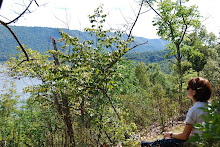Well, well, well. It looks like the news media knows what to cover and where!
On Sunday, a New York Times columnist used his column to write about the story of the two men behind Yachana Foundation. Hopefully that name sounds familiar to ya, because that means you read this post about my visit to Yachana Lodge when our study abroad group went to the Amazon in late February.
It's great to see Yachana getting coverage like this because what the foundation is doing is really special. I feel really lucky that we got to visit the Amazon under its watch. I also feel lucky that Juan Kunchikuy, the indigenous half of the Yachana business pair, is the one who served me that tasty grub!
I'm pasting the text of the column below, just because I know that then there's a better chance that you'll read it.
April 27, 2008
Op-Ed Columnist
Odd Couple of the Jungle
By NICHOLAS D. KRISTOF
IN THE AMAZON JUNGLE, Ecuador
Douglas McMeekin was a failed businessman in Kentucky, and Juan Kunchikuy was a hunter in a remote nook of the Amazon rain forest who killed monkeys, deer and wild pigs with a blowgun and poison darts.
Now this unlikely pair has joined forces in a remarkable campaign to save the rain forest, “the lungs of the earth” that suck up the carbon we spew out. Of all the struggles to fight climate change, this is one of the more quixotic — and inspiring.
The Amazon rain forest that both men treasure is being hacked down, along with other tropical forests around the world. More than half of the world’s tropical rain forest is already gone, and every second of every day, another football-field-size chunk is destroyed.
Mr. McMeekin, now 65, started out not as an environmentalist but as an entrepreneur running a hodgepodge of small businesses in Lexington, Ky., employing about 50 people. In the 1982 recession, he went bankrupt.
Pained and disillusioned, he decided to go far away — to Ecuador, where he eventually found work in the Amazon as a liaison between international oil companies and indigenous tribes. He came to love the people, and his heart went out to them.
In school, Mr. McMeekin had suffered from undiagnosed dyslexia. “I was just a ‘dumb kid,’ and carrying that burden is difficult,” he recalled. The stigma left him empathizing with the Amazon natives, who were often scorned by outsiders as slow and backward because they were unschooled.
Mr. McMeekin began the Yachana Foundation in 1991 to promote education among natives of the Amazon, and in the course of his travels by canoe (there are few roads in the region), he met Mr. Kunchikuy, then a boy living in a cluster of huts a five-hour walk from any other village. Mr. Kunchikuy and his family were semi-nomadic, speaking an obscure tribal language (his real name is Tzerem, but an Ecuadorian official filling out his birth certificate turned that into “Juan”). They survived largely by hunting with darts tipped with home-made curare poison.
Mr. Kunchikuy was one of 12 siblings, of whom five died in childhood. One of his grandfathers was speared to death in a war with a rival tribe; another grandfather adorned his house with the shrunken heads of enemies he had killed.
At the time, in 1995, Mr. McMeekin was building an eco-lodge in the jungle for American tourists, to finance his dreams of promoting education for local people. So he invited the boy to move to the lodge and work and study. At the age of 17, Mr. Kunchikuy left his pocket of the rain forest for the first time — and encountered such wonders as shoes, electricity, running water, telephones and cars.
It was soon obvious that Mr. Kunchikuy had a first-rate mind, so Mr. McMeekin sponsored his education and a home-stay visit to Boston, where in the winter he encountered a puzzling white substance that was very cold. His tribal language, Shiwiar, has no word for snow, ice, freezing or even anything very cold. So after his return, it was tough to describe to his friends how his host family had taken him ice skating and snow-boarding.
Mr. Kunchikuy now speaks fluent English, on top of his other languages — Shiwiar, Spanish, Quichua, Achuar and Shuar, not to mention his mastery at calling monkeys and birds in the jungle. He became a naturalist and guide at the Yachana Foundation’s 18-room eco-lodge, which tourists reach by riding in a canoe for nearly three hours.
Now 30, Mr. Kunchikuy points wildlife out to American tourists and demonstrates that grubs can be tasty. He also displays his impressive collection of scars, from vampire bats, a piranha, a caiman, a stingray, and a shaman who operated on his chest to block another shaman’s black magic. In his spare time, he demonstrates how to shoot a blowgun.
“It has a range of up to 150 feet,” he explained. “It’s better than a shotgun, because it’s silent. You can shoot repeatedly if you miss the first time.” (Keep an eye on nytimes.com in the coming days for a video of Mr. Kunchikuy using his blowgun to spear a papaya balanced on my head — but don’t tell my wife.)
Yet the traditions he grew up with are eroding, much like the rain forest. Loggers are chipping inexorably away at the Amazon, robbing the planet of biodiversity and of a great carbon sink that absorbs our greenhouse gas emissions. On top of that, the deforestation itself, including slash-and-burn clearing, accounts for 20 percent of global carbon emissions, the same amount as that produced by the United States or China. Several studies declare that the low-hanging fruit in the war against climate change is keeping these forests alive.
In my next column, on Thursday, I’ll tell you how Mr. McMeekin and Mr. Kunchikuy are doing just that.
Subscribe to:
Post Comments (Atom)



No comments:
Post a Comment